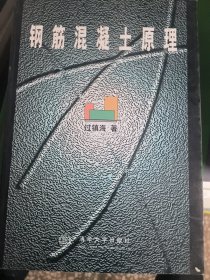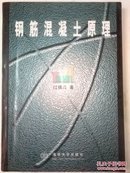
钢筋混凝土原理
¥ 95 6.9折 ¥ 138 九品
仅1件
河北廊坊
认证卖家担保交易快速发货售后保障
作者过镇海(Zhenhai Guo) 著
出版社清华大学出版社
出版时间2014-12
版次1
装帧平装
上书时间2023-02-02
- 最新上架
商品详情
- 品相描述:九品
图书标准信息
- 作者 过镇海(Zhenhai Guo) 著
- 出版社 清华大学出版社
- 出版时间 2014-12
- 版次 1
- ISBN 9787302385301
- 定价 138.00元
- 装帧 平装
- 开本 16开
- 纸张 胶版纸
- 页数 590页
- 【内容简介】
- 《钢筋混凝土原理》详细介绍结构混凝土的主要材料特点和各种受力和变形性能,以及混凝土和钢筋共同工作的特殊性能。进而以试验为基础,概括了基本构件在各种内力作用下的性能变化规律、工作机理和计算方法,从而揭示了钢筋混凝土用作一种组合结构材料的基本原理和分析方法。对于工程中可能遇到的一些极端工况,包括疲劳、地震、爆炸、高温(火灾)和耐久性损伤等,介绍了材料和构件的特殊性能及其分析方法。《钢筋混凝土原理》是以结构工程专业研究生编写的同名课程的教材,也适合相似专业本科生的教与学;对于从事结构工程有关的科学研究、设计和施工的技术人员,在处理工程问题时也可用作参考。
- 【目录】
-
Preface
CHAPTER 1 Introduction
1.1 Development and features of reinforced concrete structure
1.2 Characteristics of this course
PART 1 MECHANICAL BEHAVIOR OF CONCRETE
CHAPTER 2 Basic MechanicaI Behavior
2.1 Material composition and characteristic
2.1.1 Composition and internal structure
2.1.2 Basic characteristics
2.1.3 General mechanism of failure process
2.2 Compressive strength
2.2.1 Cubic compressive strength
2.2.2 Failure process of prism specimen
2.2.3 Main indices of mechanical behavior
2.3 Complete compressive stress-strain curve
2.3.1 Testing method
2.3.2 Equation for complete curve
2.4 Tensile strength and deformation.
2.4.1 Testing method and index of tensile behavior
2.4.2 Tensile failure process and characteristic
2.4.3 Equation of complete stress--strain curve
2.5 Shear strength and deformation
2.5.1 Rational testing method
2.5.2 Failure characteristic and shear strength
2.5.3 Shear strain and modulus
CHAPTER 3 Behavior Under Influence 0f Main Factors
3.1 Load acted repeatedly
3.2 Eccentric compression
3.2.1 Testing methOd
3.2.2 Main experimental results
3.2.3 Stress-strain relation
3.3 Eccentric and flexural tensions
3.3.1 Failure process
3.3.2 Ultimate tensile strength and plasticity—dependent cocoefficient
3.3.3 The maximum tensile strain at ultimate load
3.3.4 Variations of strain and_~eutral axis of section
3.3.5 Equations for complete stress--strain curve
3.4 Age
3.4.1 Compressive strength
3.4.2 Modulus of elasticity
3.5 Shrinkage
3.5.1 Kind and quantity of cement
3.5.2 Property,size,and quantity of aggregate
3.5.3 Curing condition
3.5.4 Environmental condition of service stage
3.5.5 Shape and size of structural member
3.5.6 Other factors
3.6 Creep
3.6.1 Basic concept
3.6.2 Main influence factors
3.6.3 Calculation formulas
CHAPTER 4 Various StructuraI Concrete
4.1 High—strength concrete
4.1.1 Application and preparation
4.1.2 Basic mechanical behavior一
4.2 Light—weight concrete
4.2.1 Classification
4.2.2 Basic mechanical behavior
4.3 Fiber concrete
4.3.1 Classification.
4.3.2 Basic mechanical behavior
CHAPTER 5 Multiaxial Strength and Constitutive Relation.
5.1 Experimental equipment and method
5.2 General regularities of multiaxial strength and deformation.
5.2.1 Biaxial stress states
5.2.2Triaxial stress states
5.2.3 Different materials and loading paths
5.3 Typical failure pattems and their boundaries
5.3.1 Breaking in tension
5.3.2 Columnar crushing
5.3.3 Splitting into pieces
……
PART 2 COMBINATION FUNCTION OF REINFORCEMENT AND CONCRETE
CHAPTER 6 MechanicaI Behavior of Reinforcement
CHAPTER 7 Bond Between Reinforcement and Concrete
CHAPTER 8 MechanicaI Behavior Under AxiaI Force
CHAPTER 9 Confined Concrete
CHAPTER 10 Mechanical Response of Deformation Difference
PART 3 STRENGTH AND DEFORMATION 0F STRUCTURAL MEMBER
CHAPTER 11 Strength of Member Under Compression and Bending.
CHAPTER 12 Tensile Crack.
CHAPTER 13 FlexuraI Stiffness and Deformation
CHAPTER 14 Strength of Member Under Shear Force
CHAPTER 15 Strength of Member Under Torsion
PART 4 SPECIAL BEHAVIORS OF STRUCTURAL MEMBERS
CHAPTER 16 Seismic Resistance
CHAPTER 17 Fatigue Resistance
CHAPTER 18 Explosion Resistance
CHAPTER 19 Fire Resistance
CHAPTER 20 Durability
Appendix
References
Index
点击展开
点击收起
相关推荐
— 没有更多了 —























以下为对购买帮助不大的评价